Revamped JCBs in demand as prices for new machinery rise
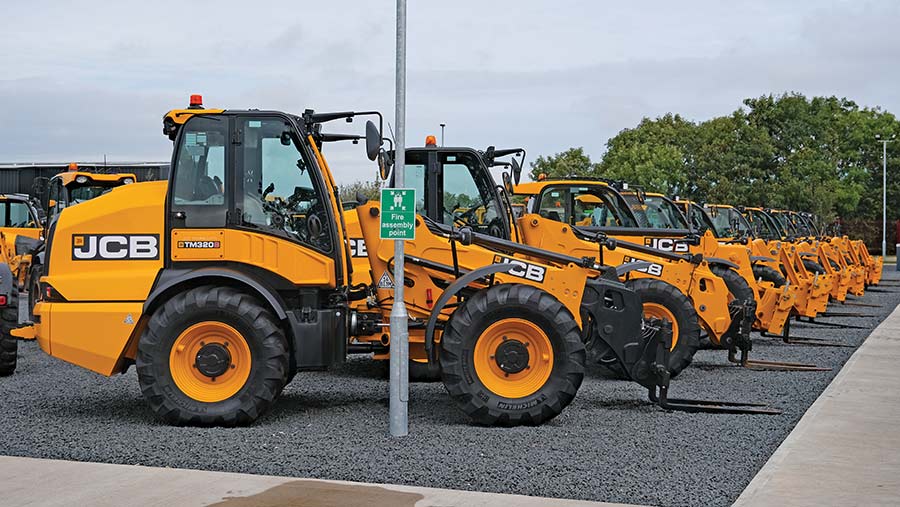 © James Andrews
© James Andrews When second-hand machinery comes with a bargainous price tag, one can overlook the odd ding, oil leak or patch of flaky paint.
But with costs for used equipment higher than ever, expectations for its appearance and mechanical condition are, rightly, far higher.
Of all the self-propelled agricultural machines, telehandlers are among the toughest to keep anywhere near factory-fresh, meaning even well-maintained examples can look cosmetically tatty after just a couple of years in action.
See also: What to look for when buying a used JCB telehandler
In the past, main dealers might have put in considerable effort to tidy up such examples, but with their resources often focused on new machines, there’s less and less time for selling trade-ins.
After noticing the lack of presentable second-hand Loadalls on the market, JCB specialists Ed Roach and James Wetton decided to do something about it.
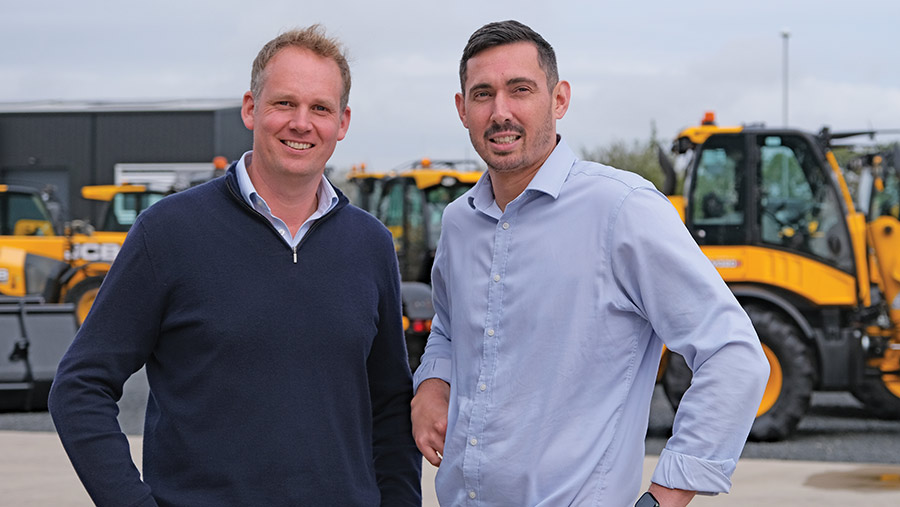
Ed Roach (left) and James Wetton © James Andrews
By pooling their expertise – Ed formerly worked in sales for JCB and James as a senior technician for dealer G&J Peck – they started buying up used handlers and giving them a thorough overhaul before selling them on.
“The aim is to offer people smart-looking machines where all the functions work and they have peace of mind that it has been thoroughly checked and prepared,” says Ed.
Their business, Thorncliffs, started off at James’ kitchen table, before quickly moving to a local contractor’s yard.
And now, five years on, they’re operating from a purpose-built facility in Sleaford, with a well-appointed workshop, shotblasting booth, paint facility and sales forecourt.
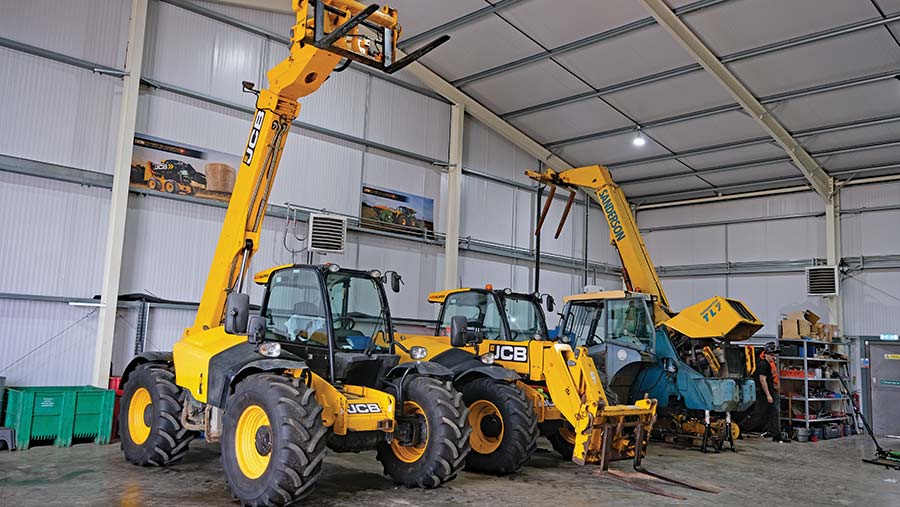
© James Andrews
Sourcing used handlers
The pair have access to a ready supply of used handlers, most of which come in the form of trade-ins from main JCB dealers they have developed a close working relationship with.
Often these dealers, who don’t have time to do the work themselves, will buy fully prepared telehandlers back from Thorncliffs to sell on to their customers.
Machines also come from Thorncliffs’ own hire fleet, which are sold on after a couple of years while they are still on low hours.
Generally, the pair focus on models up to 10 years old, but condition and hours are more important than age.
James says: “We like to source nice machines and get them up to near-new condition, so we try to avoid anything that’s too rough or abused – you never know what sort of hidden problems these might come back with in the future.”
They also aim to have 45-50 popular machines in stock to satisfy a broad mix of customers, with prices ranging from £20,000 up to nearly new, plus the odd cheap trade-in.
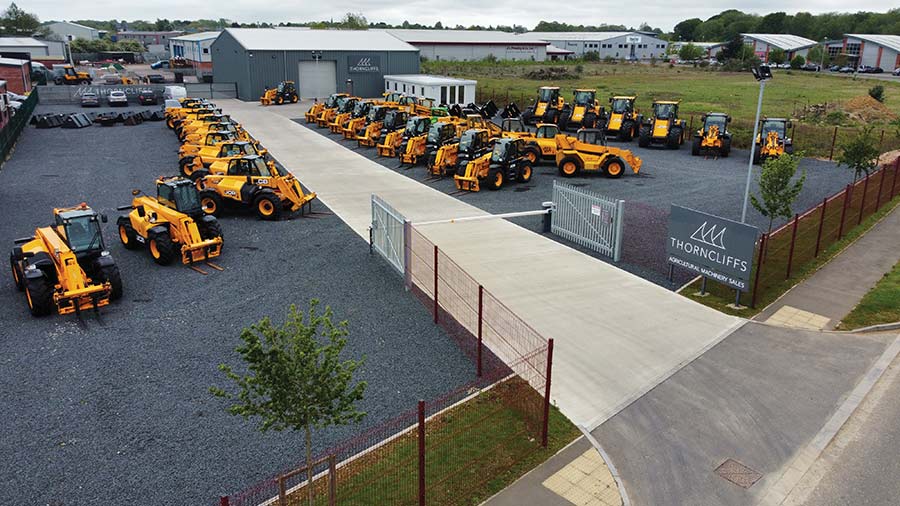
© James Andrews
Popular models
On the rigid telehandler front, the 541-70 Agri Super is by far the most popular. With a 4.1t lift capacity and 7m maximum lift height, it’s ideal for arable farms and larger livestock producers.
Before the latest round of safety regs, smaller 3.6t models were more than adequate for many buyers.
But the fact that these machines can no longer be pushed so hard means a higher capacity is required to do the same work.
Simpler powershift transmissions are still the most sought after, although there is some demand for the Dual Tech hybrid, which offers hydrostatic drive at lower speeds, before switching to powershift.
Straw contractors are also keen on the 536-95, which has a 9.49m maximum lift for building high stacks of bales.
As for pivot-steer machines, Ed and James like to have a few TMs in stock – although these are harder to find in decent condition – and a couple of wheeled loaders such as the popular 435S.
Common problems
Most of the work carried out on Loadalls is to rectify wear and tear, such as worn pins and bushes and ram seals. Powershift transmissions are generally solid and engines last well, providing they have been properly maintained.
Injectors can give trouble, though, particularly if someone has pressure-washed the top of the engine. Ed and James currently have several sets with a specialist firm for refurbishment.
Hub seals are another regular replacement item, and it is common for radiators to rust out if grot is allowed to build up in the bottom of the engine bay.
They also have to replace the odd broken widow, plus scores of mudguards and cab rear roof sections.
Gateway ECUs are another potential weak spot, particularly those that were sent out of the factory with short connector pins.
These aren’t that easy to source, and Thorncliffs has to get a main dealer to fit them at a cost of about £800.
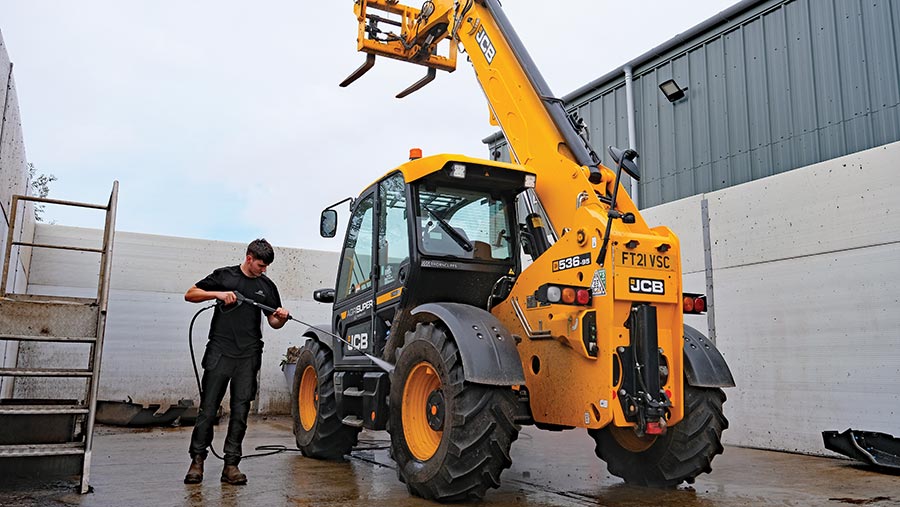
© James Andrews
Preparation process
Upon arrival, each handler gets a thorough steam clean followed by a rigorous multipoint inspection to identify any work that needs doing.
This covers everything from engine, hydraulics and structural checks to windscreen wipers, fluid levels and the function of the seat.
Any major items, such as worn bushes, brakes and structural repairs, are carried out straight away, but the finishing touches generally take place after the machine has been sold.
“This helps us get them on the forecourt quickly and means customers have plenty of choice,” says James.
When the time comes for the final prep, all damaged parts are repaired or replaced and any poor paintwork is shotblasted and resprayed.
JCB yellow tends to stay in fairly good order, but the black paint is notoriously poor. This means the spray booth stays gainfully employed painting Loadall cab sections and engine bay bases.
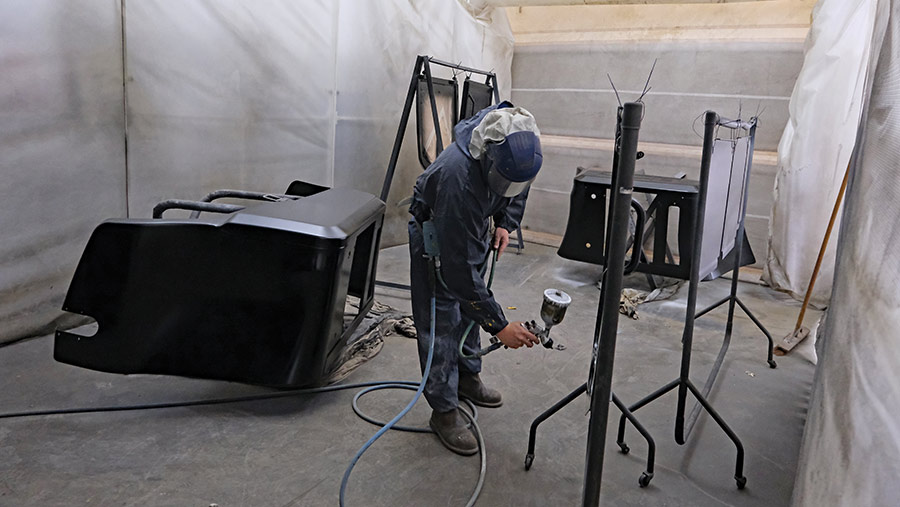
© James Andrews
Machines are also given a comprehensive service and fitted with a decent set of tyres before being issued with a Loler certificate. They’re then sold “retail ready” with a 28-day, 100-hour warranty.
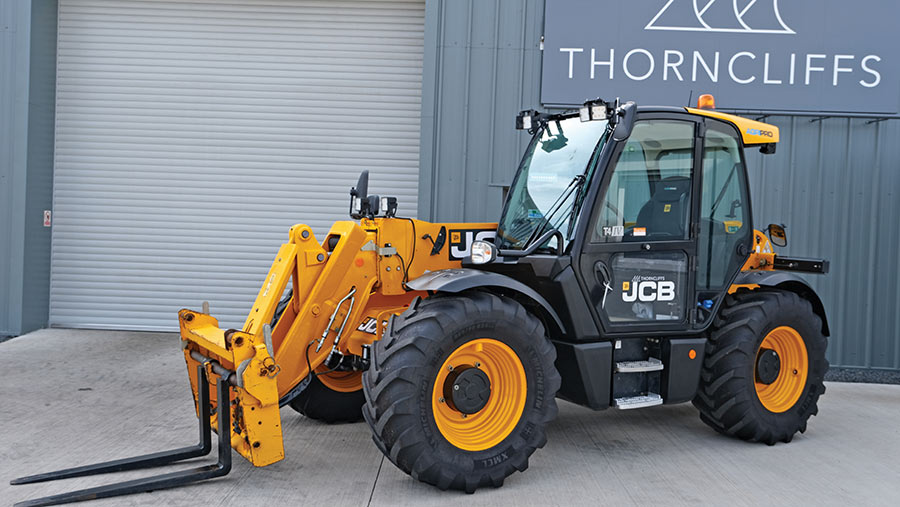
2017 541-70 Agri Pro © James Andrews
One machine that’s recently gone through the process is a 2017 541-70 Agri Pro with 3,495 hours on the clock. It’s been given the full overhaul, including having most of the black paint resprayed, and is priced at £62,500.
For buyers who don’t want this level of service and are willing to do some jobs themselves, there is the option to buy a machine sold-as-seen, with a correspondingly lower price tag.
Anyone wishing to do this is presented with a list of problems, so they know exactly what they are getting.
